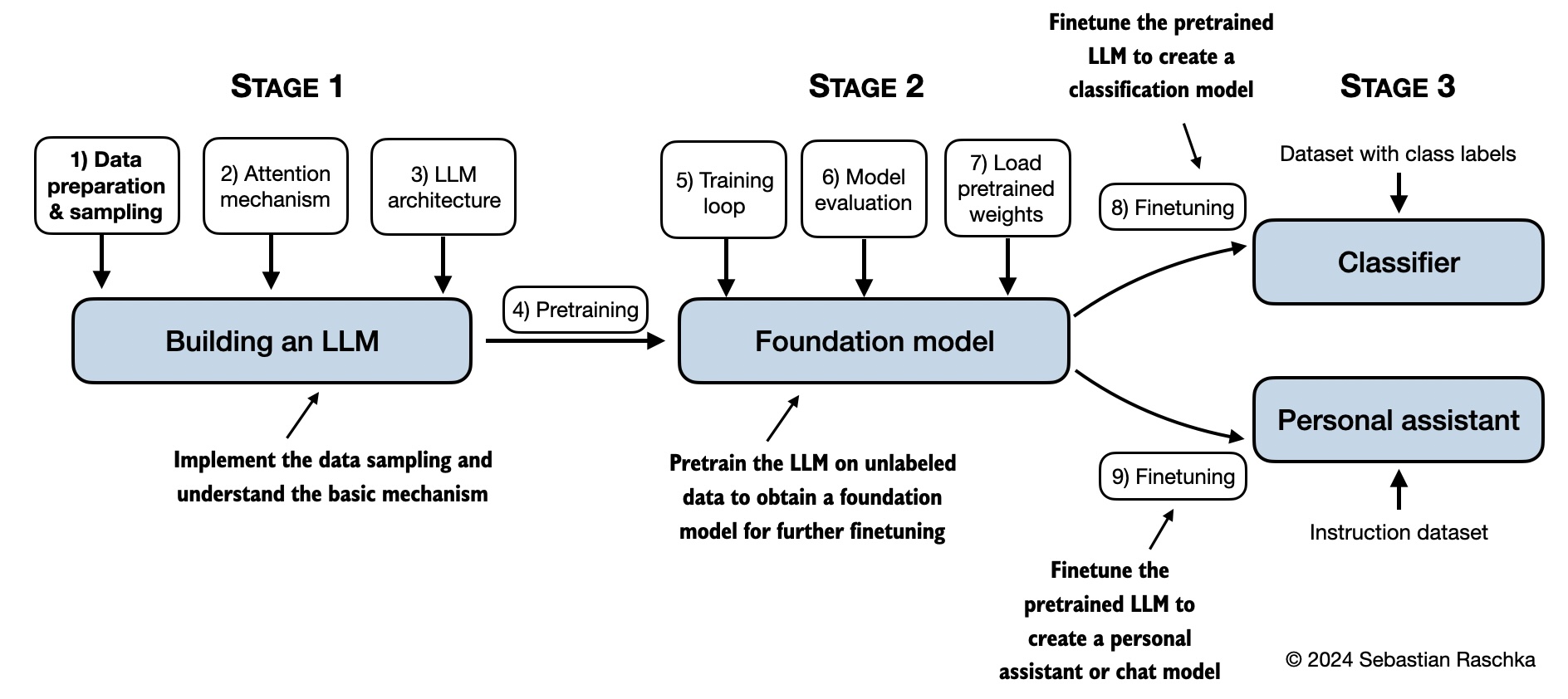This repository contains the code for coding, pretraining, and finetuning a GPT-like LLM and is the official code repository for the book Build a Large Language Model (From Scratch).
(If you downloaded the code bundle from the Manning website, please consider visiting the official code repository on GitHub at https://github.com/rasbt/LLMs-from-scratch.)
In Build a Large Language Model (From Scratch), you'll learn and understand how large language models (LLMs) work from the inside out by coding them from the ground up, step by step. In this book, I'll guide you through creating your own LLM, explaining each stage with clear text, diagrams, and examples.
The method described in this book for training and developing your own small-but-functional model for educational purposes mirrors the approach used in creating large-scale foundational models such as those behind ChatGPT.
- Link to the official source code repository
- Link to the book at Manning
- Link to the book page on Amazon
- ISBN 9781633437166
Please note that this README.md file is a Markdown (.md) file. If you have downloaded this code bundle from the Manning website and are viewing it on your local computer, I recommend using a Markdown editor or previewer for proper viewing. If you haven't installed a Markdown editor yet, MarkText is a good free option.
Alternatively, you can view this and other files on GitHub at https://github.com/rasbt/LLMs-from-scratch.
Tip
If you're seeking guidance on installing Python and Python packages and setting up your code environment, I suggest reading the README.md file located in the setup directory.
| Chapter Title | Main Code (for quick access) | All Code + Supplementary |
|---|---|---|
| Setup recommendations | - | - |
| Ch 1: Understanding Large Language Models | No code | - |
| Ch 2: Working with Text Data | - ch02.ipynb - dataloader.ipynb (summary) - exercise-solutions.ipynb |
./ch02 |
| Ch 3: Coding Attention Mechanisms | - ch03.ipynb - multihead-attention.ipynb (summary) - exercise-solutions.ipynb |
./ch03 |
| Ch 4: Implementing a GPT Model from Scratch | - ch04.ipynb - gpt.py (summary) - exercise-solutions.ipynb |
./ch04 |
| Ch 5: Pretraining on Unlabeled Data | - ch05.ipynb - gpt_train.py (summary) - gpt_generate.py (summary) - exercise-solutions.ipynb |
./ch05 |
| Ch 6: Finetuning for Text Classification | - ch06.ipynb - gpt-class-finetune.py - exercise-solutions.ipynb |
./ch06 |
| Ch 7: Finetuning with Human Feedback | Q2 2024 | ... |
| Appendix A: Introduction to PyTorch | - code-part1.ipynb - code-part2.ipynb - DDP-script.py - exercise-solutions.ipynb |
./appendix-A |
| Appendix B: References and Further Reading | No code | - |
| Appendix C: Exercise Solutions | No code | - |
| Appendix D: Adding Bells and Whistles to the Training Loop | - appendix-D.ipynb | ./appendix-D |
| Appendix E: Parameter-efficient Finetuning with LoRA | - appendix-E.ipynb | ./appendix-E |
Shown below is a mental model summarizing the contents covered in this book.
The code in the main chapters of this book is designed to run on conventional laptops within a reasonable timeframe and does not require specialized hardware. This approach ensures that a wide audience can engage with the material. Additionally, the code automatically utilizes GPUs if they are available.
Several folders contain optional materials as a bonus for interested readers:
- Setup
- Chapter 2:
- Chapter 3:
- Chapter 4:
- Chapter 5:
- Chapter 6:
- Chapter 7:
If you find this book or code useful for your research, please consider citing it:
@book{build-llms-from-scratch-book,
author = {Sebastian Raschka},
title = {Build A Large Language Model (From Scratch)},
publisher = {Manning},
year = {2023},
isbn = {978-1633437166},
url = {https://www.manning.com/books/build-a-large-language-model-from-scratch},
note = {Work in progress},
github = {https://github.com/rasbt/LLMs-from-scratch}
}

